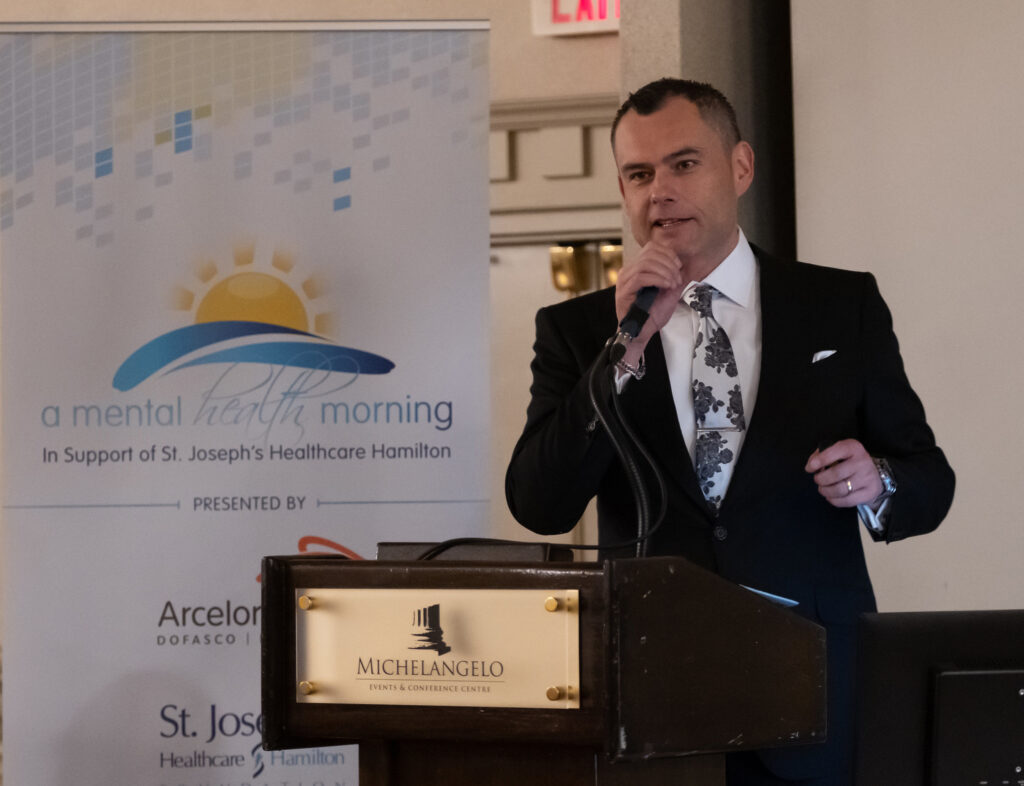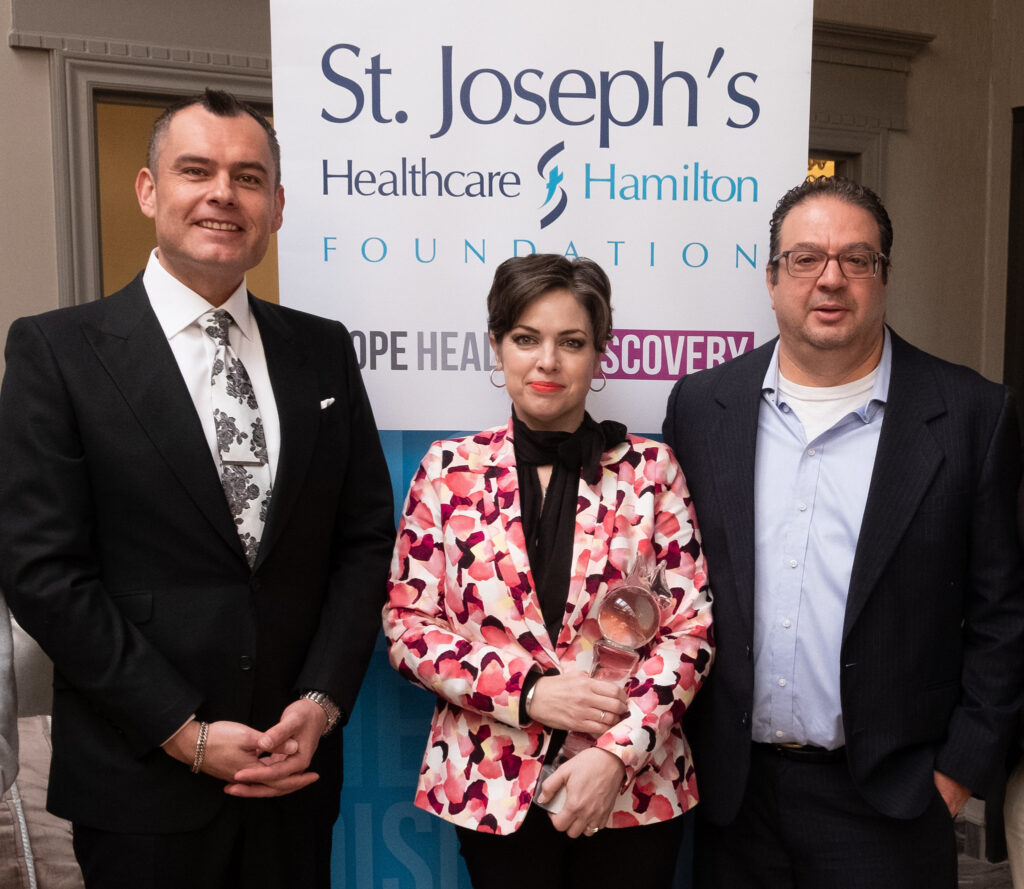‘It’s up to us to be kind,’ says author Jesse Thistle

Acts of empathy showed a way forward out of homelessness, addiction, crime and intergenerational trauma, best-selling writer of From the Ashes tells St. Joseph’s A Mental Health Morning crowd.
It was a handful of acts of kindness shown to him by family, acquaintances and strangers that led Jesse Thistle to find a way out of homelessness, drug addiction and a life of crime.
None of them were grand or elaborate. They were simple, somewhat ordinary, displays of empathy and decency but that is exactly the message the best-selling author of From the Ashes delivered to a packed room at the St. Joseph’s Healthcare’s A Mental Health morning event Thursday.
Every single one of us has the power to change someone else’s life.
Now a critically acclaimed writer of two books and an assistant professor at York University, Thistle shared his inspiring story at the 10th annual fundraiser for mental health and addictions programs at St. Joe’s.
Thistle – who now lives in Hamilton – talked about his journey as one of “native survivance,” which can mean both survival and endurance or survival and resistance. Thistle says he subscribes more to the latter, reflecting on the resistance to oppression shown by his mother’s Metis ancestors.

Thistle and his two brothers were uprooted from Saskatchewan by their father and moved to Ontario. Their father, a criminal and drug addict, couldn’t care for them and they were taken in by their paternal grandparents.
“My grandparents were superheroes. It took me a long time to realize what they did for us.”
But when he started doing drugs at 15 and dropped out of school at 18, they couldn’t watch him go down the same road as his father and kicked him out.
For more than a decade, Thistle bounced in and out of shelters, detox centres and prisons. His criminal record includes assault, theft, and break and enters. He was desperate to feed his drug addiction and felt disconnected from society.
Driven by hunger, Thistle went into a Chinese market to shoplift some noodles and ground pork. He’d stolen from there before but this time, security caught him. Instead of calling the police, the owner put more noodles and meat into his bag and she told him to go home.
“That small act of kindness changed my heart. It made me see I was human and not just a thief.”
While in court-ordered rehab centre for a year, which required a punishing routine of work, therapy and church, he came in contact with a university professor who taught him to speak respectfully and to take care of his clothes and hair.
These ordinary skills – lost during his time on the streets – gave him back his dignity and self-respect. He earned his high school diploma, improving his reading by poring over encyclopedias until the sentences made sense.
He finished at the top of his class and then did a bridging program at Carleton University, again finishing first. He made a promise to his grandmother on her deathbed that he would earn a degree.
The same day she died, he started talking online to Lucie, a friend from his teenage years who reached out when she learned he was in rehab. Their relationship turned to love and she motivated him to stay on track. Despite the protests of her friends, she allowed him to move in with him when he left the centre.
That’s the ultimate act of kindness that put Thistle on a new path. He did odd jobs and started a history program at York University when Lucie threatened to leave him if he didn’t fulfil the promise he’d made.
“I was terrified that first day. All these young people with years of education and laptops, when I had a pen and paper. They didn’t earn their high school diplomas in jail or rehab.”
In second year, he did an essay about his family’s experience of colonialism that led to an invitation to be a research assistant with history professor Carolyn Podruchny, who is considered a leading scholar of Metis history.
“She saw this middle-aged balding Indigenous man who was trying to make sense of his past and what happened to his people in the late 19th century.”
Thistle says he came to understand the impact ancestral history and intergenerational trauma had on his immediate family and his own choices and “I saw my place in the long story of my people.”
After earning a series of high-profile academic awards, Thistle told his story to a newspaper reporter. An offer for a book deal almost immediately followed.
From the Ashes is the remarkable result. Thistle says he wrote it without anger or accusations. Instead, he chose to focus on empathy of others that led to the life he now leads, married to Lucie, father to Rose, teaching the history of his people, studying for his doctorate and sharing his story.
“Each act of kindness taught me something about myself and others,” he said, urging his listeners to buy a struggling person a sandwich, learn their name or listen to their story.
“Those are small acts of mental health outreach, resistance and reconciliation. It’s up to us to be kind.”
Nesha Gibson, vice president people and culture at ArcelorMittal Dofasco, which was the presenting sponsor of the event, said St. Joseph’s is leading the way on mental health care.
It has created the “beautiful and stigma-free space for healing and recovery” in the Margaret and Charles Juravinski Centre for Integrated Healthcare at the West 5th campus, provides emergency mental health services at the Charlton campus, contributes world-class research and clinical care and commits to shining a light on mental health and inspiring conversations, she said.
“Coming together for events like this one helps each one of us understand mental health, including substance use, and improve our own skills to cope, to heal and to be helpful to others, be it a friend, a colleague or a family member. We all have a responsibility to this.”
A Mental Health Morning also included the Spirit of Hope awards, which honour and celebrate those who have overcome mental health or addiction challenges or made impactful contributions to the field.
Artist April Mansilla was recognized in the individual category for her journey to overcome bipolar disorder and her work to help others facing the same struggle.
“I remember thinking from my psych unit bed that I would be nothing but my illness,” she said before thanking her therapists and counsellors at St. Joseph’s and her family.
“Thank you all for giving me my voice back and for encouraging me to always show up no matter how hard the day. Most of all, thank you for giving me an abundance of hope so that I can give it to others.”

Photos: Joseph Bucci/ArcelorMittal Dofasco
April and her husband Miguel, who works at ArcelorMittal Dofasco, said they feel a responsibility to let others know they aren’t alone and that help can be found.
“It brings a sense of purpose to tell your story. Keeping it to yourself hurts other people’s recovery,” she said.
Through therapy, medication and support, April has found a way forward.
Mansilla is now a peer support worker in St. Joseph’s Mood Disorders Program. She is also an artist who does art therapy outreach programs throughout the community. Her murals and art are found throughout the hospital’s West 5th campus.
The winner in the group/organization category was Shalem Mental Health Network, which offers specialized therapy for children and youth who struggle with attachment disorders and their caregivers.
The Bishop Ryan Catholic Secondary School Celtic F.R.E.E. (Fostering Respect, Equality, and Experience), a student LGBTQ2S+ group, was the winner in the youth category.












